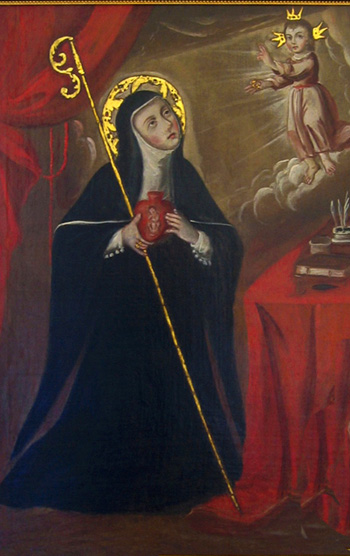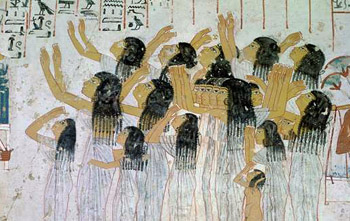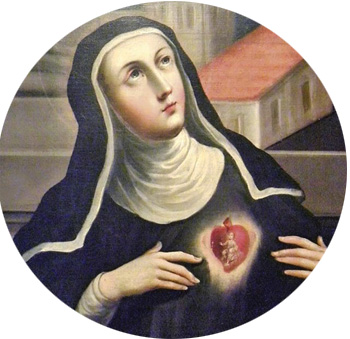Saints of the Day
 |
 |
 |
 |
 |
 |
 |
St. Gertrude the Great - November 16
Biographical Selection:
St. Gertrude of Helfta or St. Gertrude the Great, was a German Benedictine mystic. She was born on January 6, 1256, and at the age of four was placed in the Cistercian monastery of Helfta in Eisleben, Upper Saxony.
At age 25 she received the first of her visions that woul continue all her life. In particular she was given to understand great mysteries of the Sacred Heart of Jesus. Her writings helped to spread this devotion thoughout the Western world. St. Gertrude died in Helfta around 1302.
Comments of Prof. Plinio:
 In one of the extraordinary visions with which she was favored by Our Lord, St. Gertrude recounts in her Revelations that God is so avid for the love of creatures that He makes use of every artifice to keep them united to Him. Thus, to detach them from created things, He sometimes sends certain trials, which have the effect of showing them how illusory all earthly things are in terms of the happiness they provide. Indeed, even the most legitimate human affections are not free from pain and instability.
In one of the extraordinary visions with which she was favored by Our Lord, St. Gertrude recounts in her Revelations that God is so avid for the love of creatures that He makes use of every artifice to keep them united to Him. Thus, to detach them from created things, He sometimes sends certain trials, which have the effect of showing them how illusory all earthly things are in terms of the happiness they provide. Indeed, even the most legitimate human affections are not free from pain and instability.
It is curious how our age has completely lost the Catholic notion of suffering. The evolution of this process is easy to describe. Catholic resignation conserves among the living the constant memory of the dead, who are supported by the Church Militant through countless prayers. At the same time, however, that holy resignation provides the living with the strength of spirit necessary to not succumb to the constantly rekindled suffering of missing the dead for whom we continually pray.
Then modern paganism entered the scene. It began by hypertrophying one of the sentiments that made up resignation. It exalted the sorrows, bereaving and irremediable heartbreak. Everyone came to understand that, to be “decent,” the pain should be accompanied by piercing screams, fainting and at times even suicide.
The exaggeratedly dramatic and at times ridiculous character of such performances provoked an absolutely opposite reaction. Indifference began to be preached. The mourning periods become increasingly shorter. Then came the tendency to completely abolish them, not only in terms of clothing - which constitutes a very beautiful symbolism and a touching tribute to the deceased - but also the period in which people refrained from going to parties and the cinema was set aside and forgotten. Resignation was no longer sought in prayers; rather, persons simply drowned their grieving in jazz and champagne.
 As for the deceased person, he is immediately incinerated, and prudently kept in a small insignificant urn where his mortal remains occupy the smallest possible material space... In the same way his memory must also be reduced to a minimum in the memory of the living. It is pagan, brutal and as harsh as can be.
As for the deceased person, he is immediately incinerated, and prudently kept in a small insignificant urn where his mortal remains occupy the smallest possible material space... In the same way his memory must also be reduced to a minimum in the memory of the living. It is pagan, brutal and as harsh as can be.
These impressions escaped me as I wrote. Let them be a parenthesis in my commentary on St. Gertrude the Great.
‘In sinu Jesu’
Now then, in her admirable Revelations, St. Gertrude has words that perfectly explain the words ‘In sinu Jesu,’ [On the chest of Jesus. It refers to the secrets of the Sacred Heart that Jesus revealed to the Beloved Apostle St. John as he rested his head on Christ’s Divine Heart at the Last Supper.
She says: “As she (the Saint speaks of herself in the third person, out of humility) saw one of her sisters hastening to the sermon, she complained to Our Lord in these words: “Thou knowest, my Beloved, with what pleasure I would now hear this sermon were I not hindered by sickness.”

 Our Lord answered her: “Would you, my dear Spouse, have it that I should preach to you Myself?”
Our Lord answered her: “Would you, my dear Spouse, have it that I should preach to you Myself?”
“I desire it ardently,” she replied.
The Lord then drew her to Himself, in such a way that her heart rested on His Divine Heart. After having savored this sweet moment of rest, she felt the Heart of Jesus beating in two admirable and sovereignly sweet movements.
Our Lord said to her: “Each of these movements works the salvation of men in three different ways: The first works for the salvation of sinners, and the second, for that of the righteous. By the first pulsation of love, I incessantly invoke the Eternal Father, I appease His anger against sinners and I incline Him to show mercy.
“By the second, I speak to all My Saints, and, after having advocated before them the cause of sinners with the zeal and fidelity of a brother, I encourage them to pray for these poor souls.
“Thirdly, I address the sinners themselves, and mercifully call them to penance, and then I await their conversion with ineffable desire.
“By the second movement of My Heart, I first invite My Eternal Father to rejoice with Me for having poured forth My Precious Blood so efficaciously for the redemption of the just, in whose merits I find so many delights. Secondly, I invite all the celestial militia to celebrate with praise the holy lives of the righteous, and to thank Me for the many benefits that I have granted them, and that I will still further grant them.
“Thirdly, I address the righteous, and give them sweet proofs of My love, exciting them to an invincible perseverance to profit faithfully by them from day to day and hour to hour. And, as the beating of the human heart is not interrupted by the action of sight, hearing or any manual occupation, but always continues without relaxation, in the same way the government of Heaven, the earth and the entire universe cannot suspend or interrupt for even an instant this sweet beating of My Divine Heart” (chap. 43, Revelations of Saint Gertrude).
Therefore, these words “In sinu Jesu” – (chosen as the motto of the new Archbishop of Sao Paulo Carlos Carmelo de Vasconcellos Motta) – most frankly indicates a desire to open those sources of life that flow from the Heart of Jesus, and of of inserting all of São Paulo – with its palaces and workshops, its centers of study and entertainment, of art and work – into the great and adorable movement of systole and diastole, which inundates Christianity with the graces flowing from the Heart of Jesus, and which brings to the Heart of Jesus all the souls He wants to save.
A most faithful devotee of St. John the Evangelist, the new Archbishop wants us, following his example, to have our ears open to the adorable pulsations of the Divine Heart. These pulsations, and only they, will know how to erase from our souls the tumult of the unruly passions and the din of the rivalries, anger and rancors that are tearing our contemporary world apart.
To the divinely suave sound of these pulsations, we will hear the Truth, we will be innundated by Life, and in the spiritual pulsations of the Heart of Jesus we will find the Way.
There could not be a more beautiful motto. For us, Paulistas, this motto constitutes a comforting hope, a holy stimulus to unbounded devotion, and an impetus to a filial and respectful cooperation.
Legionnaire, n. 629, August 27, 1944
St. Gertrude of Helfta or St. Gertrude the Great, was a German Benedictine mystic. She was born on January 6, 1256, and at the age of four was placed in the Cistercian monastery of Helfta in Eisleben, Upper Saxony.
At age 25 she received the first of her visions that woul continue all her life. In particular she was given to understand great mysteries of the Sacred Heart of Jesus. Her writings helped to spread this devotion thoughout the Western world. St. Gertrude died in Helfta around 1302.
Comments of Prof. Plinio:

As Christ Child entered St. Gertrude’s heart, she understood the words: ‘God will be all in all’
It is curious how our age has completely lost the Catholic notion of suffering. The evolution of this process is easy to describe. Catholic resignation conserves among the living the constant memory of the dead, who are supported by the Church Militant through countless prayers. At the same time, however, that holy resignation provides the living with the strength of spirit necessary to not succumb to the constantly rekindled suffering of missing the dead for whom we continually pray.
Then modern paganism entered the scene. It began by hypertrophying one of the sentiments that made up resignation. It exalted the sorrows, bereaving and irremediable heartbreak. Everyone came to understand that, to be “decent,” the pain should be accompanied by piercing screams, fainting and at times even suicide.
The exaggeratedly dramatic and at times ridiculous character of such performances provoked an absolutely opposite reaction. Indifference began to be preached. The mourning periods become increasingly shorter. Then came the tendency to completely abolish them, not only in terms of clothing - which constitutes a very beautiful symbolism and a touching tribute to the deceased - but also the period in which people refrained from going to parties and the cinema was set aside and forgotten. Resignation was no longer sought in prayers; rather, persons simply drowned their grieving in jazz and champagne.

Wailing women mourn the dead in pagan rituals
These impressions escaped me as I wrote. Let them be a parenthesis in my commentary on St. Gertrude the Great.
‘In sinu Jesu’
Now then, in her admirable Revelations, St. Gertrude has words that perfectly explain the words ‘In sinu Jesu,’ [On the chest of Jesus. It refers to the secrets of the Sacred Heart that Jesus revealed to the Beloved Apostle St. John as he rested his head on Christ’s Divine Heart at the Last Supper.
She says: “As she (the Saint speaks of herself in the third person, out of humility) saw one of her sisters hastening to the sermon, she complained to Our Lord in these words: “Thou knowest, my Beloved, with what pleasure I would now hear this sermon were I not hindered by sickness.”

Our Lord revealed to St. Gertrude the meaning of the two movements of His pulsing Heart

“I desire it ardently,” she replied.
The Lord then drew her to Himself, in such a way that her heart rested on His Divine Heart. After having savored this sweet moment of rest, she felt the Heart of Jesus beating in two admirable and sovereignly sweet movements.
Our Lord said to her: “Each of these movements works the salvation of men in three different ways: The first works for the salvation of sinners, and the second, for that of the righteous. By the first pulsation of love, I incessantly invoke the Eternal Father, I appease His anger against sinners and I incline Him to show mercy.
“By the second, I speak to all My Saints, and, after having advocated before them the cause of sinners with the zeal and fidelity of a brother, I encourage them to pray for these poor souls.
“Thirdly, I address the sinners themselves, and mercifully call them to penance, and then I await their conversion with ineffable desire.
“By the second movement of My Heart, I first invite My Eternal Father to rejoice with Me for having poured forth My Precious Blood so efficaciously for the redemption of the just, in whose merits I find so many delights. Secondly, I invite all the celestial militia to celebrate with praise the holy lives of the righteous, and to thank Me for the many benefits that I have granted them, and that I will still further grant them.
“Thirdly, I address the righteous, and give them sweet proofs of My love, exciting them to an invincible perseverance to profit faithfully by them from day to day and hour to hour. And, as the beating of the human heart is not interrupted by the action of sight, hearing or any manual occupation, but always continues without relaxation, in the same way the government of Heaven, the earth and the entire universe cannot suspend or interrupt for even an instant this sweet beating of My Divine Heart” (chap. 43, Revelations of Saint Gertrude).
Therefore, these words “In sinu Jesu” – (chosen as the motto of the new Archbishop of Sao Paulo Carlos Carmelo de Vasconcellos Motta) – most frankly indicates a desire to open those sources of life that flow from the Heart of Jesus, and of of inserting all of São Paulo – with its palaces and workshops, its centers of study and entertainment, of art and work – into the great and adorable movement of systole and diastole, which inundates Christianity with the graces flowing from the Heart of Jesus, and which brings to the Heart of Jesus all the souls He wants to save.
A most faithful devotee of St. John the Evangelist, the new Archbishop wants us, following his example, to have our ears open to the adorable pulsations of the Divine Heart. These pulsations, and only they, will know how to erase from our souls the tumult of the unruly passions and the din of the rivalries, anger and rancors that are tearing our contemporary world apart.
To the divinely suave sound of these pulsations, we will hear the Truth, we will be innundated by Life, and in the spiritual pulsations of the Heart of Jesus we will find the Way.
There could not be a more beautiful motto. For us, Paulistas, this motto constitutes a comforting hope, a holy stimulus to unbounded devotion, and an impetus to a filial and respectful cooperation.
Legionnaire, n. 629, August 27, 1944
The Sacret Heart of Jesus: Symbol of Combativity

Watch a video illustration of this Saint of the Day article here
 | |
|
|
The texts of both the biographical data and the comments come from personal notes taken by Atila S. Guimarães from 1964 to 1995. Given the fact that the source is a personal notebook, it is possible that at times the biographic notes transcribed here will not rigorously follow the original text read by Prof. Plinio. The commentaries have also been adapted and translated for TIA’s site.


